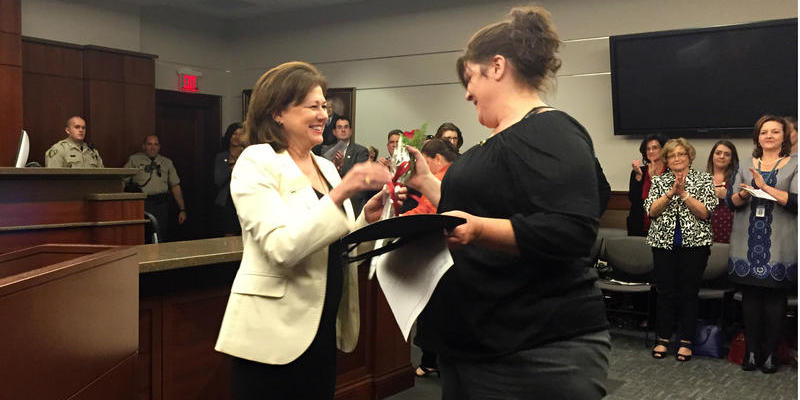Cobb County’s Mental Health Court An Alternative To Prison

Elly Yu / WABE
Three years ago, Tracy Traver was arrested for possession of cocaine and driving with a suspended license. She said it was over her 22nd or ‘20-something’ arrest – by this point she had lost count.
“I really didn’t have a clue that anything was wrong until somebody else had recognized it ─ that it wasn’t normal behavior,” Traver, 42, said.
She saw a psychiatrist at the Cobb County Jail and was diagnosed with bipolar disorder, post traumatic stress disorder and anxiety disorder. But instead of staying in jail, Traver was accepted into a new program the county offered called mental health court.
For her charges, she was facing 10 years of probation, and she said mental health court was a better option to help her avoid spending more time in prison. She said she wasn’t sure of what to expect, but she didn’t want to return to jail.
“Something hit me, and I said, ‘You know what, I’m too old to be here,’” Traver said.
She said she wanted the structure that mental health court could give her.
The court is part of a growing number of accountability courts in the state that are supposed to be alternatives to incarceration, provide treatment and help keep people in the community.
“Nobody wakes up in the morning and says ‘I think I’ll be schizophrenic today.’ It’s not a choice that people make,” said Cobb County Superior Court Judge Mary Staley.
Staley created the court in 2012 and said a program that focused on mental illness was long overdue.
According to the Cobb County Sheriff’s Office, 33 percent of the county’s current jail population is diagnosed with a mental illness. Nationwide, more than half of all prison and jail inmates have symptoms of a mental illness, according to a report by the Bureau of Justice Statistics.
“If you know much about what’s going on in mental illness in America, the jails are the mental health hospitals,” Staley said.
“That’s not, in my opinion, a very civilized way to approach a problem that we have socially,” she said.
Mental health court is a voluntary alternative to incarceration. In Cobb County, participants have to be in the program for at least 24 months and in group or individual therapy. Court staff give random drug tests at least twice a week, according to Adrienne Bowen, the court’s coordinator. But the program also helps people find jobs and housing.
The program is funded in part by state grants, and it is part of Georgia’s ongoing criminal justice reform started by Gov. Nathan Deal, Staley said. According to the Council of Accountability Court Judges of Georgia, there are now 24 adult mental health courts across Georgia that are supported by the state.
Last week, Traver and six others graduated in Cobb County’s first class of mental health court participants after spending more than two years in the program. Traver stood in front of a packed courtroom full of supporters.
“Without all of you, I’d be stuck traveling in the darkness,” Traver told the crowd. “Thank each and every one of you for giving me my life back.”
Traver still faces another eight years of probation, but said she’s eligible for early release in about two years. She said the court has helped her find stable housing and ongoing mental health services.
“I feel like I can go live my life now, like I have a life to live,” Traver said.
She currently works as a waitress and says things won’t change too much now that she’s out of the program. She said she’s grateful for the support network she’s now gained.
The court coordinator said the court will continue to follow-up on the graduates for at least five years, and to see if its program in the long-run can keep people out of Georgia’s criminal justice system.
9(MDAxODM0MDY4MDEyMTY4NDA3MzI3YjkzMw004))





